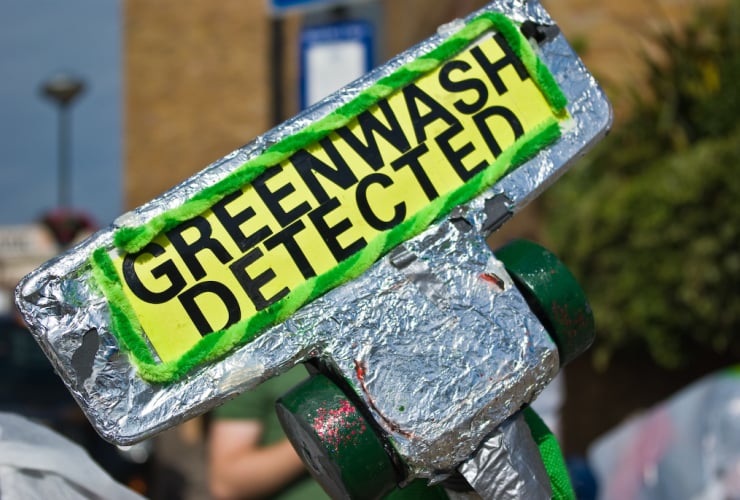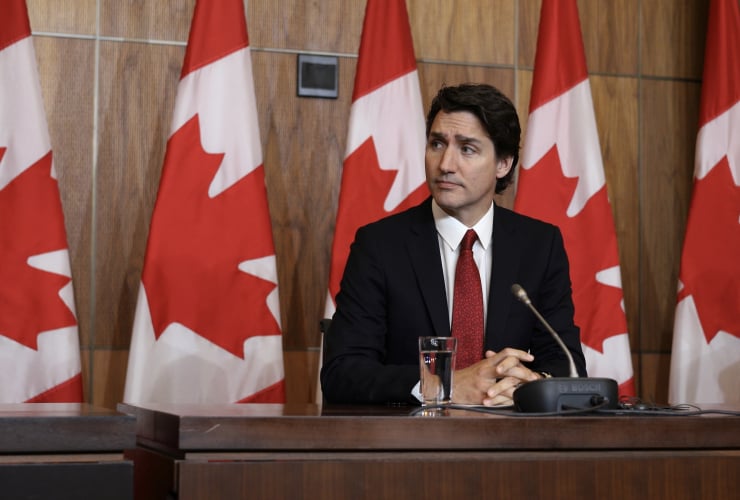Fossil fuel lobbyists have infiltrated the annual UN climate change negotiations in unprecedented numbers, with Canadian oil and gas representatives out in full force, an analysis of the official preliminary guest list reveals.
Among all the world’s delegation lists, at least 2,400 representatives of fossil fuel-linked organizations were identified by climate advocacy group Kick Big Polluters Out, roughly reflecting a fourfold increase from 636 attending last year's talks. Of Canadians, at least 65 people representing oil and gas companies, fossil fuel industry associations or organizations supportive of continued fossil fuel development are in Dubai for the summit called COP28, running until Dec. 12. That total does not include the Alberta and Saskatchewan government representatives who are out to sell continued oil and gas extraction during the climate summit. With the Prairie provinces included, the figure would leap to 104.
It’s a stunning increase from last year, where under 10 Canadian fossil fuel-linked individuals were officially on the delegate list (although that was a known undercount after Canada’s National Observer identified a Suncor representative not included on the list).
Of the total identified this year, 35 have “pink badges,” meaning they are on Canada’s delegation list, compared to 30 who have “yellow badges” and mere observer status.
The Pathways Alliance, which represents Canada’s largest oilsands producers (Suncor, Cenovus Energy, MEG Energy, Imperial Oil and Canadian Natural Resources), is well represented, with five officials with pink badges. Pathways Alliance is currently under investigation by federal regulators for alleged misleading advertising about its climate change commitments and is looking to secure billions of dollars worth of federal subsidies.
Pipeline giant Enbridge has three representatives, Suncor has two, while Imperial Oil, MEG Energy, Cenovus Energy, Tourmaline Oil and Strathcona Resources each have one individual with pink badges according to the list.
Beyond oil and gas companies, organizations for the sole purpose of lobbying for fossil fuel expansion are in Dubai, too, including the Canadian Association of Petroleum Producers (CAPP) with two representatives, and the First Nations LNG Alliance officially represented by one person. The CAPP officials do not have pink badges, meaning they’re not part of Canada’s official delegation, unlike the First Nations LNG Alliance. The First Nations LNG Alliance’s chair, Haisla Nation Chief Coun. Crystal Smith — where the planned Cedar LNG project is majority-owned by the nation — is also in attendance, with her official designation being her nation.
Groups linked to the fossil fuel industry are also out in full force, with 11 people from companies pushing technologies that extend the life of the fossil fuel industry using carbon capture or fossil fuel-derived hydrogen. One of those companies is Air Products Canada, with two representatives at COP28. It received $300 million from the federal government in 2022 to develop hydrogen made from natural gas, using carbon capture technology, in Edmonton.
Greenwashing group Clean Resource Innovation Network (CRIN), whose “vision” is for Canada to be a “global leader in clean hydrocarbons,” has 28 representatives at COP28, and even bought its own pavilion space to promote the inaccurate belief that oil and gas can be “clean.” The focus of CRIN is to promote carbon capture and other abatement technologies that can reduce emissions from extracting, transporting and refining fossil fuels. However, those technologies cannot address the 80 per cent of emissions that come from fossil fuels when they are ultimately burned.
There are also six people from groups linked to the Canadian fossil fuel industry, including the Petroleum Technology Research Centre, Alberta’s Industrial Heartland Association, and Energy for a Secure Future, whose affiliate organizations include the First Nations LNG Alliance, the Pipe Line Contractors Association of Canada, and the Canadian Gas Association.
Alberta’s delegation to Dubai officially totals 24. Premier Danielle Smith has vocally argued it’s important for the province to be out in full force to promote its oil and gas industry. Saskatchewan’s count reaches 15, led by Premier Scott Moe. No other province cracked double digits (Ontario and Quebec each sent seven people).
Financial organizations with deep ties to the fossil fuel sector are also significantly represented, with at least 13 individuals identified by Canada’s National Observer. Of Canadian banks, TD has four representatives, while BMO, RBC, and Scotiabank each have one official registered for the climate conference, according to the list. Those banks’ fossil fuel investments have totalled at least $743 billion since the Paris Agreement was signed.
Sun Life Financial, which last year Canada’s National Observer revealed held US$13.5 billion worth of investments in coal companies like Duke Energy, Southern Company, and Dominion Energy and roughly $2.4 billion invested in oil and gas companies like Royal Dutch Shell, TC Energy, Woodside Petroleum and BP, has six representatives at COP28.
Darren Woods, CEO of the world’s largest non-government-owned oil company, ExxonMobil ((which owns Canadian oilsands firm Imperial Oil), is at COP28, the first time Exxon has sent a representative. Woods made it clear to the Financial Times what his mission is — arguing the UN climate talks have focused too much on renewables and “put way too much emphasis on getting rid of fossil fuels.”
Burning fossil fuels is responsible for more than 75 per cent of global greenhouse gas emissions, according to the United Nations.
Environment and Climate Change Minister Steven Guilbeault says the federal government doesn’t decide who comes and who doesn’t, and that it simply reserves space for Indigenous groups, youth, civil society and businesses, but it’s those contingencies that decide who to send.
“We don't choose which NGOs are here or which businesses,” he said, adding “these oil and gas representatives are part of provincial delegations” and the federal government doesn't pick and choose who the provinces send, either.
Moreover, it’s the United Nations, he says. “I don't see how we could start saying to certain constituencies, ‘Well you can't come.’ Who would be the judge? And based on what criteria?
“Say you eliminate fossil fuel companies, do you eliminate cement companies because it's also very polluting, do you eliminate steel, do you eliminate airlines?” he said. “What's important is in Canada … we're not slowing down our climate action [based on] whether this makes the fossil fuel industry happy or not.”
He pointed to clean fuel standards, new methane regulations that will require deeper cuts to the potent greenhouse gas and a forthcoming framework to cap oil and gas sector emissions.
“Regardless of what the oil and gas sector is saying, we're moving forward.”
Former environment minister Catherine McKenna — who most recently chaired the United Nations' high-level expert group on net-zero commitments responsible for creating gold-standard recommendations to distinguish genuine commitments from greenwashing — told Canada’s National Observer the annual climate change negotiations are supposed to be a space for anyone committed to reducing emissions and meeting the goals of the Paris Agreement.
“The challenge with the fossil fuel companies is they're not doing anything that's required to do that,” she said. “The reality is if your emissions aren't going down, and your money's not going to clean while you make historic profits, it's very questionable why you're here.
“Layered on that, there are real concerns that folks are here to do oil and gas deals at a COP,” McKenna added. “That is completely bonkers. The oil and gas industry had their own summit in Alberta on net zero. If they want to go meet and do their oil and gas deals, do it on their own time, don't do it at COPs.”
Destination Zero executive director and member of Canada’s Net-Zero Advisory Body Catherine Abreu said it’s not a surprise to see record-breaking numbers of fossil fuel lobbyists at the negotiations because the COP28 presidency wanted to include oil and gas companies in this space.
It’s common to hear that the fossil fuel industry has a role to play in the energy transition, and Abreu agrees to a point. She says the companies should be in a “tripartite dialogue” with government and employees because workforces and communities are experiencing a significant transition.
However, “they do not have a role to play in a global space that is supposed to be about us being able to imagine a world without them,” she said. “And I'm not even putting a moral judgment on that, that's literally their job … they're private sector entities for whom their priority is to do what's best for their business. And that doesn't make them evil, but it does mean they don't belong here.”
Abreu said while better transparency about who is attending the negotiations is a welcome improvement, it speaks to the need for a conflict-of-interest policy to limit who can come to the summit.
An analysis from advocacy group Kick Big Polluters Out dug into the delegate lists from previous UN climate negotiations and identified more than 7,000 fossil fuel lobbyists over the past 20 years who have attended these meetings. Royal Dutch Shell has sent more representatives than any other, reaching at least 115, according to the analysis.
As reported by The Intercept in 2018, a Royal Dutch Shell executive boasted the company could take significant credit for sections of the Paris Agreement relating to carbon offset credits thanks to its heavy presence when the landmark climate treaty was being negotiated.
The entire event is a climate
The entire event is a climate joke! What a waste of time, energy and money.
The UN climate talks either get their act together to screen who participates or just ends these ridiculous events, as they accomplish nothing. You know oil & gas is only there to protect their ongoing business of polluting and raping & pillaging the environment. Pure greenwashing on their part.
Insincerity was present in
Insincerity was present in COP events years ago. Stephen Harper sent a delegation to more than one specifically charged to delay, delay and delay again any action to lower global emissions. This was in the middle of his Canada = energy superpower narrative featuring the potential extraction of fossil fuels from the pristine Arctic. Minister John Baird was accused by genuinely sincere delegates at one COP of being the oil industry's chief attack dog.
While it's good to see critical articles like this one detailing the dinosaur industry's shenanigans, it paints a skyscraper-sized mural of another troubling fact, how ineffective COP has become after more than a decade of erosion by carbon interests.
Those who cling to the fantasy anything of substance will come out of it (i.e. enforceable and effective policy agreements) seem to be subsumed by street theatre spectacle of protest and the dire warnings by scientists while the real work is happening inside behind closed doors. That work has little to do with bringing down emissions and everything to do with resisting and delaying meaningful action to decarbonise.
But in 2023 COP moved into pure cynicism. It evolved from an honest attempt to negotiate a decrease in GHGs that was perfectly balanced with attempts to resist decreasing emissions, into a full blown oil industry tailgate party.
The question is, what are we going to do about it?






Comments